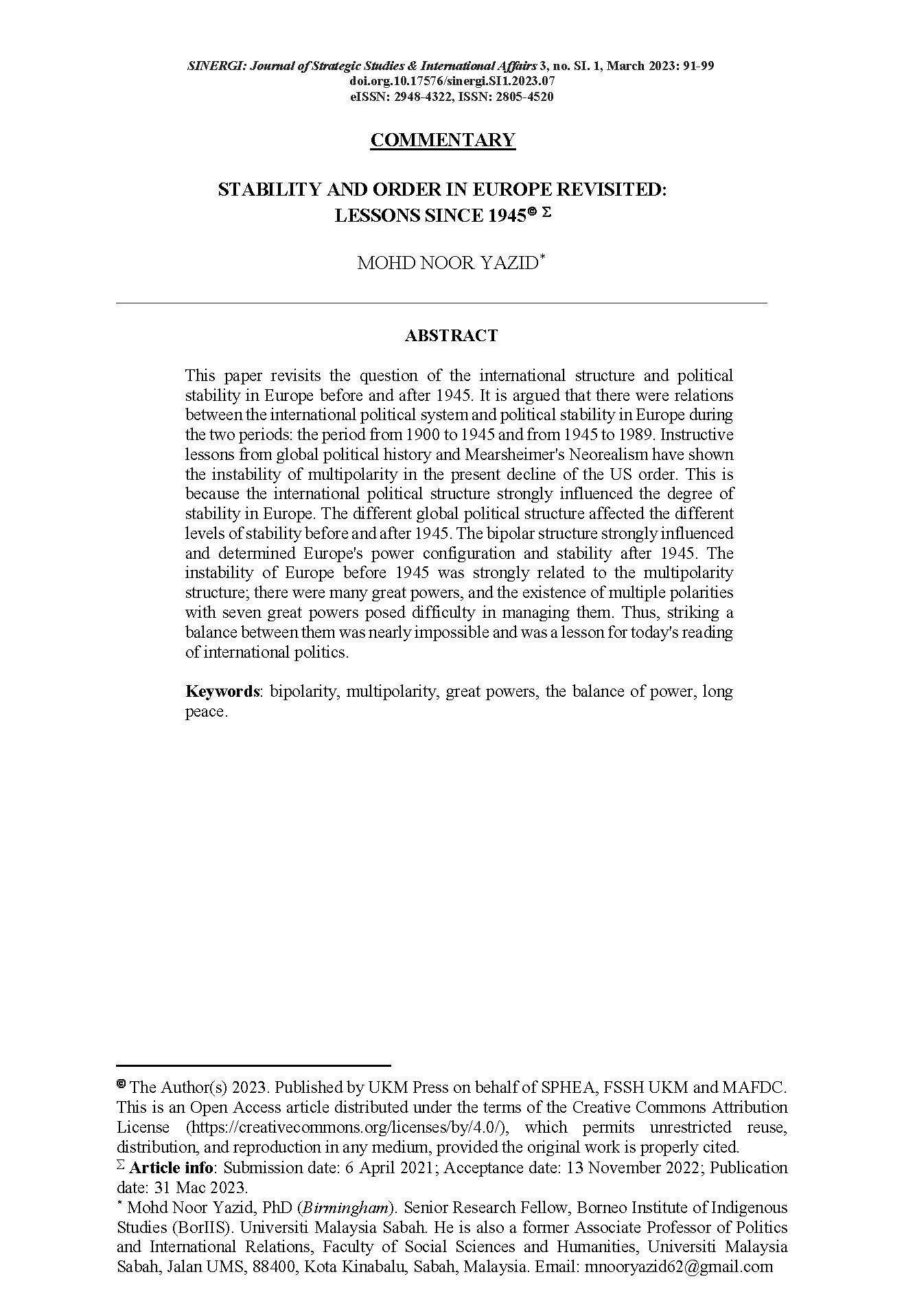Stability and Order in Europe Revisited: Lessons since 1945
Main Article Content
Abstract
Abstract: This paper revisits the question of the international structure and political stability in Europe before and after 1945. It is argued that there were relations between the international political system and political stability in Europe during the two periods: the period from 1900 to 1945 and from 1945 to 1989. Instructive lessons from global political history and Mearsheimer's Neorealism have shown the instability of multipolarity in the present decline of the US order. This is because the international political structure strongly influenced the degree of stability in Europe. The different global political structure affected the different levels of stability before and after 1945. The bipolar structure strongly influenced and determined Europe's power configuration and stability after 1945. The instability of Europe before 1945 was strongly related to the multipolarity structure; there were many great powers, and the existence of multiple polarities with seven great powers posed difficulty in managing them. Thus, striking a balance between them was nearly impossible and was a lesson for today's reading of international politics.
Keywords: bipolarity, multipolarity, great powers, the balance of power, long peace,
DOI: 10.17576/sinergi.SI1.2023.07
Article information: Submission date: 6 April 2021; Acceptance date: 13 November 2022; Publication date: 31 Mac 2023.
Declaration and acknowledgement: This study was not supported by any form of grant or financial assistance. The Author would also like to show our gratitude to SINERGI’s anonymous reviewers and their constructive feedback in improving the quality of the manuscript.
Abstrak: Kertas kerja ini meninjau semula persoalan struktur antarabangsa dan kestabilan politik di Eropah dalam tempoh sebelum dan selepas 1945. Dihujahkan bahawa terdapat hubungan antara struktur politik antarabangsa dan kestabilan politik di Eropah dalam dua tempoh tersebut; tempoh dari 1900 hingga 1945 dan dari 1945 hingga 1989. Pengajaran terpenting dari sejarah politik global dan Neorealisme menurut John Mearsheimer telah menunjukkan sifat multipolariti yang tidak stabil dikala kemerosotan orde kuasa Amerika Syarikat sekarang. Ini kerana struktur politik antarabangsa sangat mempengaruhi tahap kestabilan di Eropah. Struktur politik antarabangsa yang berbeza mempengaruhi tahap kestabilan yang berbeza sebelum dan selepas tahun 1945. Struktur bipolar sangat mempengaruhi dan menentukan konfigurasi kuasa dan kestabilan di Eropah selepas tahun 1945. Ketidakstabilan Eropah sebelum tahun 1945 berkait rapat dengan struktur multipolariti yang wujud, kepelbagaian kuasa besar, dan kewujudan pelbagai polar kuasa dengan tujuh kuasa besar sehingga menimbulkan kesukaran untuk menguruskannya. Oleh itu, mencapai keseimbangan sesama mereka adalah hampir mustahil dan memberi pengajaran untuk pengamatan politik antarabangsa hari ini.
Kata kunci: bipolariti, multipolariti, kuasa besar, perimbangan kuasa, keamanan yang berpanjangan,
DOI: 10.17576/sinergi.SI1.2023.07
Maklumat artikel: Tarikh Penghantaran: 6 April 2021; Tarikh penerimaan: 13 November 2022; Tarikh penerbitan: 31 Mac 2023.
Penghargaan dan pengisytiharan: Kajian ini tidak disokong oleh sebarang bentuk geran dan bantuan kewangan. Penulis juga ingin menunjukkan rasa terima kasih kami kepada pengulas tanpa nama SINERGI dan maklum balas membina mereka dalam meningkatkan kualiti manuskrip.
Downloads
Article Details

This work is licensed under a Creative Commons Attribution-NonCommercial-NoDerivatives 4.0 International License.
To learn more about our Open Acess and Copyright Policy, click here
References
Acharya, Amitav. 2021. ASEAN and Regional Order: Revisiting Security Community in Southeast Asia. London: Routledge
Acharya, Amitav., and Barry Buzan. 2019. The Making of Global International Relations and Evolution of IR at Its Centenary. Cambridge: Cambridge University Press.
Baldwin, David A. Ed. 1993. Neorealism and Neoliberalism: The Contemporary Debate. New York: Columbia University Press.
Copeland, Dale, C. 2000. The Origins of Major War: Hegemonic Rivalry and the Fear of Decline. Ithaca, New York: Cornell University Press.
Donnelly, Jack. 2000. Realism and International Relations. Cambridge: Cambridge University Press.
Forde, Steven. 1995. “International Realism and the Science of Politics: Thucydides, Machiavelli and Neorealism.” International Studies Quarterly 39, no. 2: 141-160.
Haas, Mark L. 2003. “Ideology and Alliances: British and French External Balancing Decision in the 1930s.” Security Studies 12, no. 4: 34-79.
Haas, Mark, L. 2007. The Ideological Origins of Great Power Politics, 1789-1989. Ithaca, New York: Cornell University Press.
Kennedy, Paul. 1989. The Rise and Fall of the Great Powers: Economic Change and Military Conflict from 1500 to 2000. New York: Vintage.
Liff, Adam P. 2019. “Unambivalent Alignment: Japan’s China Strategy. The US Alliance, and the ‘Hedging Fallacy.” International Relations of the Asia-Pacific 19, no. 3: 453-491.
McKeil, Aaron. 2023. “Order without Victory: International Order Theory Before and After Liberal Hegemony.” International Studies Quarterly 67, no. 1: https://doi.org/10.1093/isq/sqad002
Mearshiemer, John, J. 1982. “Why the USSR Can’t Win Quickly in Central Europe.” International Security 7, no. 1: 3-39.
Mearshiemer, John, J. 1990. “Back to the Future: Instability in Europe after the Cold War.” International Security 15, no. 1: 5-56.
Mearshiemer, John, J. 1994/1995. “The False Promise of International institutions.” International Security 19, no. 3: 5-49.
Mearshiemer, John, J. 2014. The Tragedy of Great Power Politics (Revised edition). New York: W.W. Norton & Company.
Mohd, Noor Yazid. 2021. “The Post-Cold War International Political Development in Europe: from Bipolar to Uni-polarity Structure.” International Journal of Innovation, Creativity and Change 15, no. 5: 927-939.
Morgenthau, Hans J., Kenneth Thompson, and David Clinton. 2005. Politics among Nations: The Struggle for Power and Peace (7th edition). New York: McGraw-Hill Education.
Nye Jr, Joseph, S., and David A. Welch. 2011. Understanding Global Conflict: An Introduction to Theory and History (8th edition). Boston: Longman-Pearson.
Rendall, Matthew. 2006. “Defensive Realism and the Concert of Europe.” Review of International Studies 32, no. 3: 523-540.
Sorenson, Georg, Jorgen Moller, and Robert Jackson. 2022. Introduction to International Relations: Theories and Approaches (8th edition). Oxford: Oxford University Press.
Viotti, Paul R., and Mark V. Kauppi. 1993. International Relations Theory: Realism, Pluralism, Globalism (2nd edition). New York: Palgrave Macmillan.
Waltz, Kenneth. 1979. Theory of International Politics. New York: McGraw-Hill.
Waltz, Kenneth. 1988. “The Origin of War in Neorealist Theory.” The Journal of Interdisciplinary History 14, no. 4: 615-628.
Waltz, Kenneth. 1993. “The Emerging Structure of International Politics.” International Security 18, no. 2: 44-79.
Waltz, Kenneth. 2000. “Structural Realism after the Cold War.” International Security 25, no. 1: 5-41.
Waltz, Kenneth. 2008. Realism and International Politics. London: Routledge.

